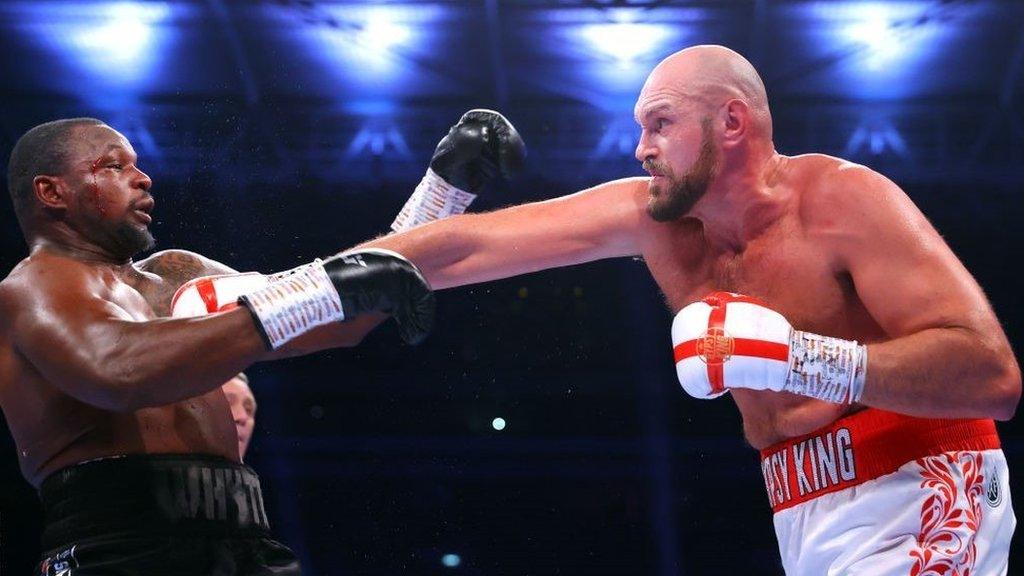The Amir Khan effect: First coach Mick Jelley and boxers he has inspired on fighter's legacy
- Published
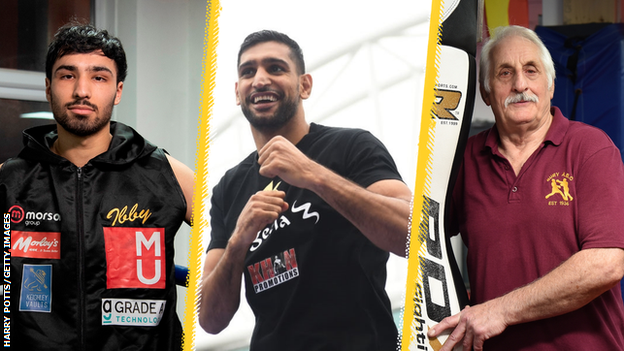
Amir Khan already has a lasting legacy in boxing
Amir Khan v Kell Brook | |
|---|---|
Venue: Manchester Arena, Manchester Date: Saturday, 19 February | |
Coverage: Follow on live text, the BBC Sport website & app from 21:00 GMT |
Amir Khan underlined his position as one of British boxing's biggest draws after more than 20,000 tickets for his upcoming fight against Kell Brook sold out in a matter of minutes.
Bury Defence Academy chairman Ifti Ahmed puts that response down to the "Amir Khan effect".
It is a phenomenon he has witnessed first-hand since welcoming Bury Amateur Boxing Club, run by Khan's first coach Mick Jelley, to share the gym of his combat sports charity last May.
"We noticed as soon as we brought boxing here there was a surge in demand," said Ahmed, whose gym in Lord Street, Bury - in premises owned by the neighbouring Jamia Khizra Mosque - had previously only offered wrestling and martial arts training.
"From our point of view, that response has come from the fantastic reputation Mick has in the heart of the Muslim community because of what he achieved with Amir Khan.
"Amir is seen as someone local. Someone who came from a very humble, working-class background. He got into boxing, was dedicated and, through Mick, reached fantastic heights.
"A lot of young lads in this local area see him as an inspiration - someone whose footsteps they can follow in."
The level of interest in this month's Khan-Brook fight at the Manchester Arena could well point to something deeper than the added spice of a grudge match years in the making.
It is fair to say that Khan's pro record is not significant enough in itself to justify such staunch support.
Despite unifying the WBA and IBF light-welterweight world titles, losses to Breidis Prescott, Lamont Petersen and Danny Garcia checked Khan's rise to the very top.
And while recent fights have included big pay-days against Saul 'Canelo' Alvarez and Terence Crawford, both ended in tame sixth-round defeats.
Yet for many fans, the 35-year-old Boltonian remains a cultural icon following his trail-blazing efforts to win silver at the 2004 Olympic Games in Athens.
The then 17-year-old's youthful enthusiasm and personal charm won him fans in living rooms up and down the country, and turned an army of supporters, particularly in the British Asian communities, on to the sport of boxing for the very first time.
The true impact of that breakthrough is only just coming to light.
Ibrahim Nadim, 22, is scheduled to fight in his sixth professional bout on the Khan-Brook undercard after battling up through the amateur ranks at Khan's first club, Bury ABC.
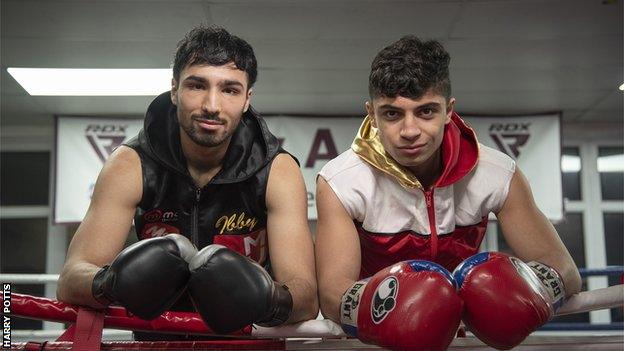
Ibrahim Nadim (left) with Amir's cousin Abdul Khan (right) who were both inspired by Amir Khan
He says he was inspired as a young boy after members of his family gathered to watch Khan fight on television.
"We all loved to watch him because he was young and his style was so exciting," said Nadim. "We all used to be there cheering him on and that motivated me to do the same. I used to watch a lot of his fights and try to copy him."
Nadim joined Bury ABC aged 11, making the 70-mile round trip from his home in Keighley, West Yorkshire, twice a week to train with the man who coached Khan to gold at the World Junior Championships and Youth Olympics, as well as silver in Athens.
He was able to replicate some of Khan's success, winning national ABA titles at schoolboy, youth and senior levels before turning pro in 2019. The super-bantamweight now trains with Ricky Hatton.
"When Khan won the silver medal at the Olympics, he paved the way for a lot of British Asians, as well as GB boxing in general," added Nadim.
"If you look at boxing now there are a lot more Asians involved than there used to be.
"There are also a lot of Asian boxers who are up-and-coming. That's because of Amir, because he has motivated them, me included."
England Boxing has only recently started to compile data on its members' ethnicity, but the figures have shown an upward trend.
Out of 19,216 registered boxers, the amateur sport's governing body has 3,294 members from "ethnically diverse communities (EDC)". That figure has increased, year-on-year, from 1,626 in 2017, when data was first collected.
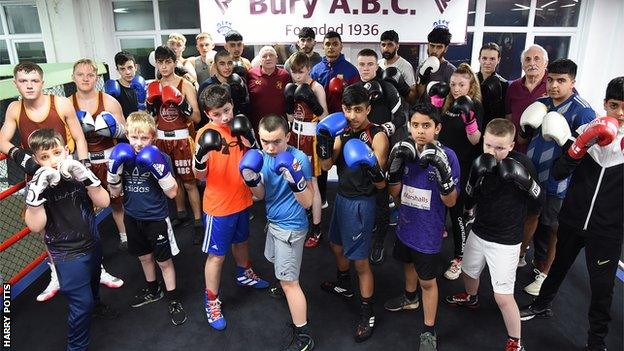
Bury ABC is welcoming more and more British Asian youngsters to the gym
Within the EDC total, 829 members declared their ethnicity as British Asian, but the number is expected to be more, as a further 1,560 preferred not to declare their ethnicity.
However, despite a perceived surge of interest in boxing in Asian communities, only a handful have followed Khan into the national team.
Since 2008, seven boxers of Asian descent - six men and one woman - have competed for the GB boxing team. Two of those, Qais Ashfaq and Muhammad Ali, qualified to compete at an Olympic Games, both boxing for Britain at Rio 2016.
Bradford-based Ali followed the same path as Khan, training at Bury ABC, becoming the club's second Olympian in its 86-year history.
As Ahmed has seen, young Asian fighters continue to flock to Bury ABC in pursuit of their own Olympic dream.
Considering Jelley's coaching record, that is perfectly understandable.
He trained Amir's brother, Haroon, helping him win a silver medal fighting for Pakistan at the 2010 Commonwealth Games in India, and oversaw the early development of former super-bantamweight world champion Scott Quigg.
The 77-year-old coach is proud of Amir's achievements but is keen to play down those links when taking on new recruits.
"Everybody who comes through that door wants to be Amir Khan - but there is only one," Jelley said.
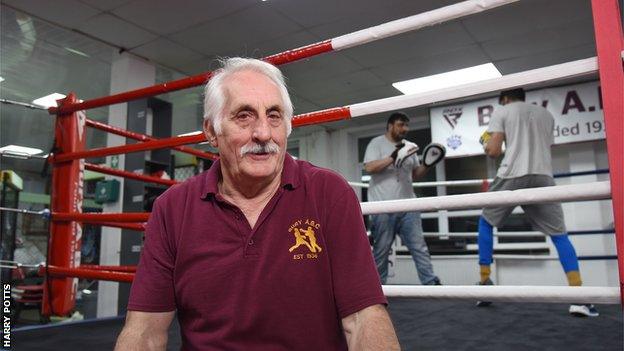
Mick Jelley trained Amir Khan during his amateur days
"Out of every 25 lads that come into the gym, you might only get one that is good enough to put into amateur competition.
"We don't want it to be all about Amir, we want it to be about everybody, always looking forward, but it's true Amir's name and what we did together has helped to bring people into the club."
While it might be impossible to draw a clear line between Khan and future generations of Asian boxers, he does seem to have started a ripple effect.
Just as Nadim was inspired to take up the sport as a youngster after watching Khan box, it is anticipated others will latch on to today's Asian boxers to do the same.
Ahmed believes the "Khan effect" could have just as profound an impact outside the ring as within it.
Some of his volunteers are being supported by Jelley to take level one coaching qualifications with England Boxing. An increase in the number of Asian coaches is seen as key to the continued growth of the sport within the community.
Ahmed also believes having a multicultural club such as a Bury ABC based in the heart of the town's Muslim community is having a welcome impact on integration.
And, just as Khan's Olympic exploits helped bridge gaps between communities back in 2004, he believes his true legacy is that that process is continuing to this day.
"Mick is like a father figure for white lads, Asian lads, black lads - for all communities," said Ahmed. "Regardless of your religion or race, if you are good and you are dedicated, Mick will help you reach your potential.
"What better way to minimise and eradicate racism and hatred by bringing together different communities? Young lads, from a young age, mixing, learning to respect one another.
"That has improved relationships between different ethnic and religious groups, which is a fantastic outcome in this collaboration."

'I can't wait to get started': The remarkable story of Christian Eriksen's comeback as he returns to the Premier League
'All good music makes me happy': A tasteful selection of mood-lifting songs curated by Martin Freeman

Related topics
- Published16 October 2022
